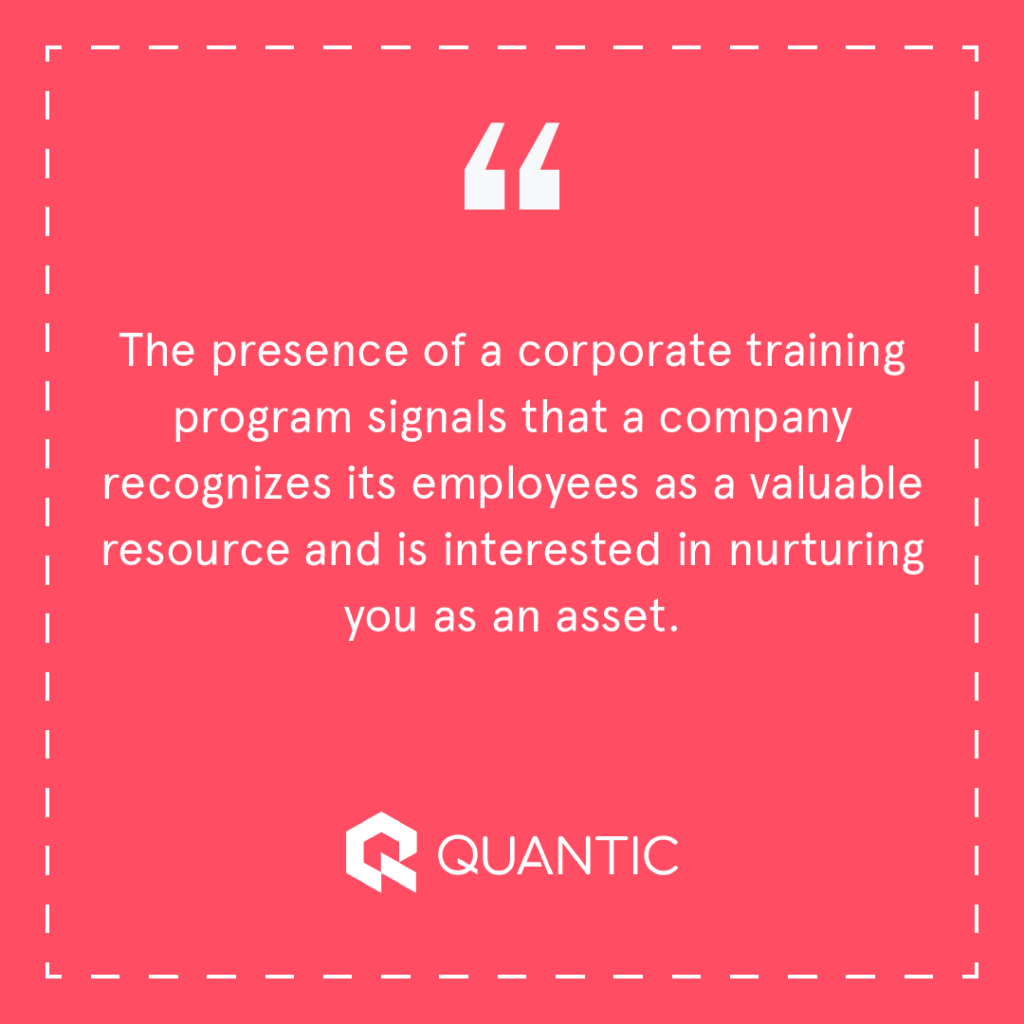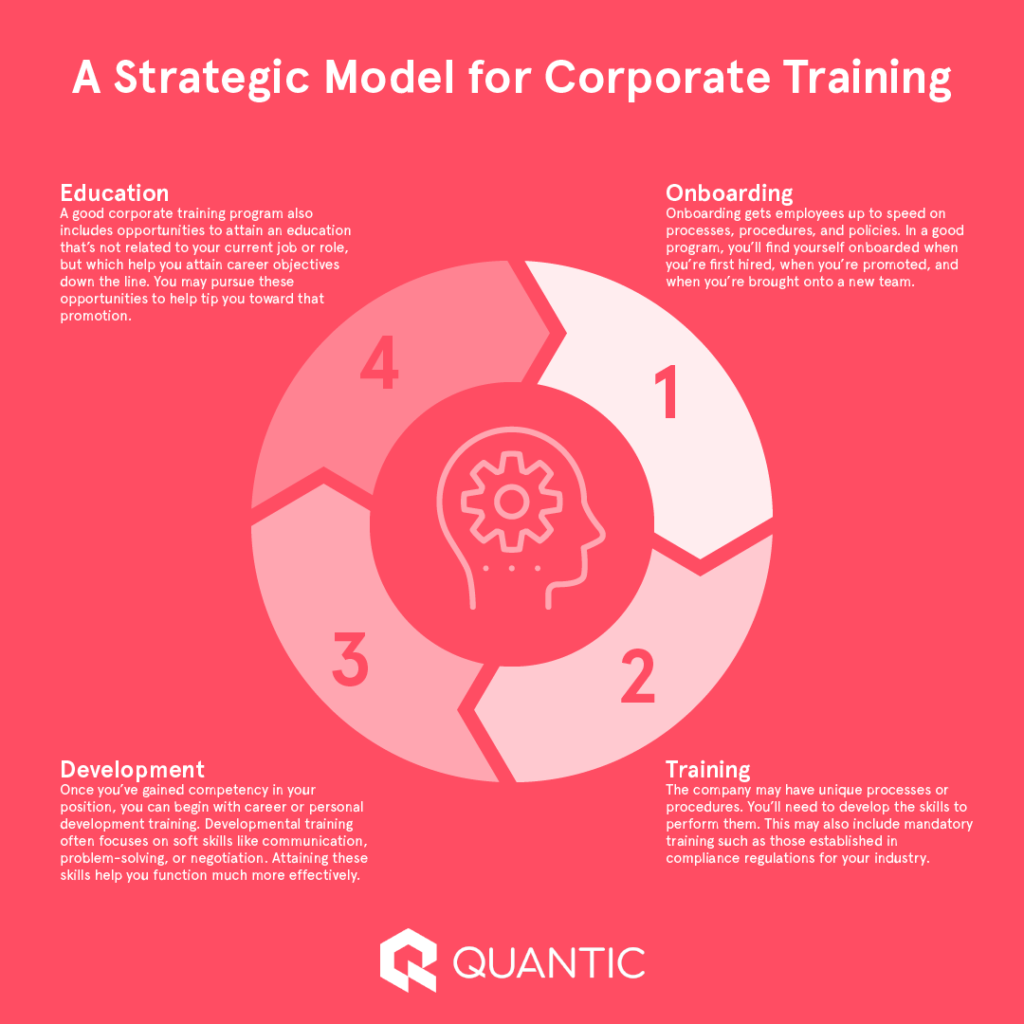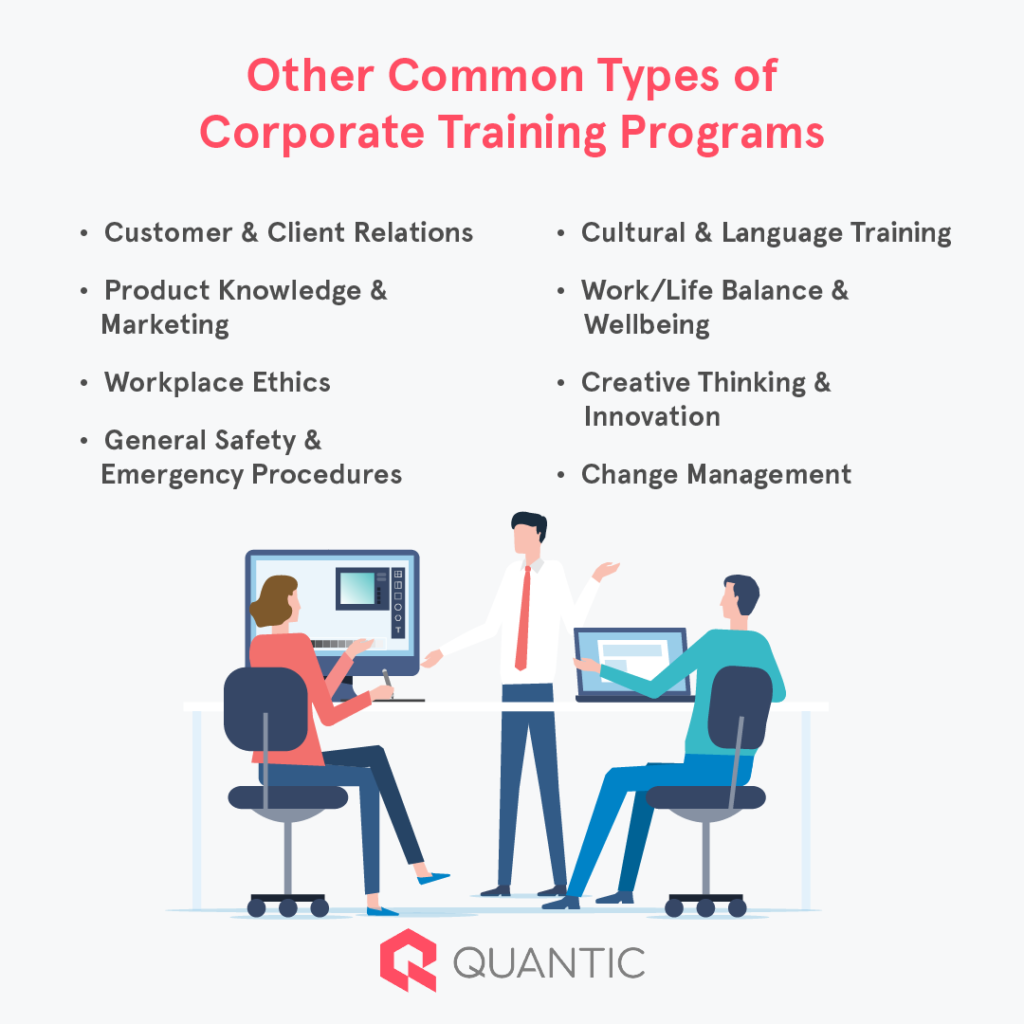CAREER PLANNING
Corporate Training & Development: Why It’s Important in 2021
No matter your industry, role, or career objectives, knowledge is power. You need it if you want to advance and maintain the same level of performance that won you that promotion.
How do you go about getting the skills and knowledge you need? That’s where corporate training and development come into play. In the 2020s, it’s going to play a huge role in the way organizations think about and invest in their employees.
That’s why we’ve put together this handy guide. We’ll uncover:
- What corporate training is and why it’s so important
- Tips to maximize the benefits of corporate training and corporate eLearning
- How to identify the right corporate training courses that work best for you
By the time you’re through, you’ll know exactly what a solid corporate training program looks like and how to make the most of what’s out there to accelerate your career.
What Is Corporate Training?
Corporate training refers to organized professional development activities created by companies to help their employees be more effective on the job. If you’ve ever taken a set of courses created and hosted by your employer, you’ve had a taste of what it entails.

These days, you’ll often see it called Corporate Education or Workplace Learning, but it’s a little different from the concept of on-the-job training. Corporate training is:
- A form of continued education. You may encounter online courses, seminars, or series of lectures much like a traditional college class. This is especially true if your company uses outside resources or institutions that offer corporate training.
- Geared toward your holistic professional development. It will help you attain the skills you need to be an effective corporate professional.
- Not always company-specific. Corporate training is designed to help you excel in your current role and become more valuable to the company over time. However, you’ll usually also develop skills that you can take with you to other companies.
How You’ll Benefit From Corporate Training
A good corporate training program is one of the most critical things to look for when you consider taking a position in a company. The presence of one signals that the company recognizes its employees as a valuable resource and is interested in nurturing you as an asset. This has a host of benefits for both the company and you. Research suggests that you’ll enjoy:
- Increased efficiency and competence at your job
- Greater motivation and morale
- A stronger and more cohesive company culture
- Stabler teams and relationships due to fewer turnovers
Corporate Training Processes That Support Your Success
Imagine one Friday that you walk into your yearly review with your boss, who’s so enthused about your performance that you get a promotion. Congratulations! In the corporate world, that’s what everyone wants to hear.
Come Monday, get dressed up in your most confidence-inspiring outfit and head into the office. Your first task? A meeting with a key partner in an hour about an initiative spearheaded by your department. All right, you say. New position, new experience! Then, your boss hands you spreadsheets you’ve never seen before to help you prepare. By the way, after that, you’re having lunch with two of your department’s team leaders to discuss the findings in that meeting. No pressure.
It’s a good thing you had time for that online corporate training module over the weekend to help you get up to speed, right? Thanks to those processes your company has developed to help support your career, you’ve totally got this.
What a Strategic Model for Training & Development Looks Like
A strategic corporate training model typically has four phases. As you move through the ranks of your company, you’ll encounter them. They are:
- Onboarding. Onboarding gets employees up to speed on processes, procedures, and policies. In a good program, you’ll find yourself onboarded when you’re first hired, when you’re promoted, and when you’re brought onto a new team.
- Training. The company may have unique processes or procedures. You’ll need to develop the skills to perform them. This may also include mandatory training such as those established in compliance regulations for your industry.
- Development. Once you’ve gained competency in your position, you can begin with career or personal development training. Developmental training often focuses on soft skills like communication, problem-solving, or negotiation. Attaining these skills help you function much more effectively.
- Education. A good corporate training program also includes opportunities to attain an education that’s not related to your current job or role, but which help you attain career objectives down the line. You may pursue these opportunities to help tip you toward that promotion.
Although these are arranged linearly, you might find yourself moving through all four stages multiple times. They’re designed to complement one another and holistically improve your career.
For example, in the story above, you may have gone through these steps when you were first hired. However, you went through at least the first two steps again when you were promoted. As you settle into your new role, you may also consider additional courses that help you develop professionally, or which provide you with the education you need to move forward again.

Tips to Maximize the Benefits of Corporate Training
Corporate training accelerates your career growth by giving you the skills and knowledge you need to achieve your goals. However, like with any continuing education, you’re going to get out of it what you put into it. We recommend that you:
- Make corporate training programs a priority when you job search. Research whether the company you’re interested in working for has a corporate training program. If the job listing doesn’t mention it then someone on Glassdoor, Reddit, or Quora might have the scoop.
- Identify your time and learning needs. Determine whether you need flexibility, certain time allowances, or for the material to be presented in a certain way. That will help you identify a program that works for you.
- Create a plan and a schedule. Make training and development a priority by putting it into your schedule. That will help you commit.
- Don’t be afraid to seek out third-party corporate training on your own. If your company doesn’t offer corporate training, look into organizations or institutions that provide it. Likewise, check with your company to see if they’ll offer tuition reimbursement.
4 Types of Corporate Training Programs
Many types of corporate training programs exist, and the company you work for might have many. They generally fall into four distinct categories:
1. Mandatory Learning
Mandatory learning involves legally required training that employees must receive. Sometimes, this happens regularly. Other times, it only has to happen once. Some examples of required training include:
- Safety-related training, such as under OSHA or the FAA
- Affirmative defense training
- Ethics training, such as under the Federal Acquisitions Regulations
- Privacy and security training under HIPAA
2. Leadership and Management
If you’re advancing to a management role, prepare to hit the books! According to LinkedIn, managers spend 30 percent more time learning new soft skills than the average person. Corporate training for leadership and management is often offered to individuals preparing to move into management positions for the first time, or into higher-level leadership positions. You’ll gain expertise in things like:
- Project and team management
- Communication
- Negotiation
- Organizational structure
3. Department or Role-Specific Training
A company that’s committed to helping you develop professionally will offer corporate training directly related to your department or specific. That’s crucial when you transition to a new role or team, as it will help you get off on the right foot immediately. Department or role-specific training will include:
- An overview of necessary processes, policies, and procedures
- Resources for developing a deeper understanding of your role
4. Executive Readiness
Companies seeking to build, train, and grow their executive team often invest in executive readiness training programs. If attaining an executive position is among your career objectives, it’s well worth your time to consider these. Executive readiness training often takes the form of an EMBA program. These programs are like an MBA but focus more on the exact skills you’ll need as an executive in a corporation. A good EMBA:
- Is accredited
- Offers focuses and specialties
- Has enough electives that you can broaden your skillset
- Still teaches you the core business skills you need

What Is Corporate eLearning?
Corporate eLearning is the use of eLearning tools and solutions for corporate training. In other words, it’s digital and online learning for your professional development … much like online classes in college.
It’s also what you’re most likely to encounter when you sign up for your company’s corporate training program. Over the past 16 years, corporate eLearning has grown by an astounding 900 percent. From 2017 alone, the number of companies using eLearning jumped from 77 to 98 percent.
This tremendous growth is largely because there are many benefits of eLearning for corporate training for both companies and employees. With corporate eLearning, you’ll enjoy:
- Greater schedule flexibility. You’ll access training and materials on your own time, in the comfort of your own home.
- A differentiated learning experience. It’s easier to receive a customized learning experience that helps you close the specific skills gaps you have.
- Self-paced learning. You’ll maximize knowledge retention by studying at your own pace.
- The ability to learn on your own device. Rather than learning a new system or device, you’ll stay focused on learning the material you need to advance on familiar grounds.
These benefits can make or break your success, especially if you undertake a challenging endeavor like executive readiness training. (Checking out an EMBA program? Consider the full advantages of an online course over a traditional course.)
How to Get the Most Out of Corporate eLearning Solutions
Whether you’re enrolled in a company-provided program or pursuing corporate training independently, there are a few things that you can do to help you get the most out of your program. DO:
- Look into customization options. Whether that includes signing up for electives or configuring a course interface to facilitate your learning style, make the eLearning experience one that works for you.
- Set yourself up for success with the right hardware. Make sure your experience is a profitable one by having the right technology to support your learning.
- Treat your eLearning and training as part of your job. Online learning can sometimes fall “out of sight and out of mind.” Keep it visible by putting it on your calendar and carving out a specified time for it.
Companies With Excellent Training & Development Programs
According to the American Society for Training and Development, companies with comprehensive corporate training and development programs generate 218 percent higher revenue and 24 percent higher profit margins.
And companies have taken notice. Here are three excellent examples of corporate training and development programs (plus what’s unique about them) to help you get a sense of what these programs include.
- Etsy School. Etsy’s Learning and Development team helps employees develop professionally using evidence-based approaches and innovative formats. It’s unique in that development pathways for each employee stem directly from performance reviews.
- Data University. Created by AirBnB, Data University strives to make the workforce more data literate. This unique approach allows employees to take courses, gain the “credentials” they need to move forward, and even includes Intensive units on specific skills.
- Yelp’s Learning Culture. Rather than creating a separate university or training hub, Yelp adopts the attitude that “every day can be a school day” and has many initiatives for integrated learning. Both hard skills and soft skills are emphasized, as well as overall employee satisfaction to keep everyone engaged.
Key Takeaways to Build the Best Corporate Training for Your Executive Team
With the majority of companies offering some sort of corporate training, you’ve got plenty of opportunities to grow the hard and soft skills that can accelerate your career. We’ve covered how corporate training can help you develop professionally, as well as provided plenty of tips to help you make the most of whatever corporate training program you choose. You’re now ready to go forth, expand your skills, and seize the new opportunities corporate training creates.
Happy advancing!



